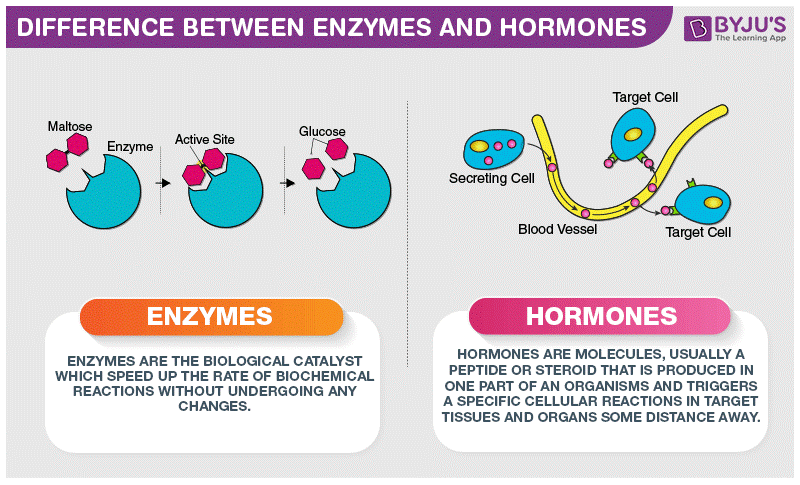The human body is an intricate piece of machinery that requires many biological functions to survive. Aiding our anatomical and physiological makeup, many chemicals enable certain functions that are necessary for life. These “chemicals” can be categorised as enzymes and hormones.
One of the major differences between enzymes and hormones is that enzymes act as a catalyst for a reaction, and hormones act as messengers that trigger various functions in the body.
Enzymes vs Hormones
The crucial difference between hormones and enzymes is their chemical composition. Most enzymes are proteins. On the other hand, hormones can either be made up of proteins, amino acids or even steroids. All the other major differences between enzymes and hormones are summarized below:

| The Difference Between Enzymes and Hormones | |
|---|---|
| Enzymes | Hormones |
| Catalyst: Accelerates the rate of a reaction | Messenger: Triggers functions in the body |
| Predominantly composed of proteins | Composed of proteins, amino acids, steroids, etc |
| Retains chemical make-up after use, hence can be reused | Chemical composition changes after use, hence may or may not be reused |
| External factors acutely affect the regulation of enzymes, such as temperature, pH levels, etc | External factors do not affect hormones as acutely as enzymes. |
| Exocrine glands produce enzymes
(salivary glands, gastric glands) |
Endocrine glands produce hormones
(thyroid and pituitary glands) |
| Enzyme secretion is not much affected by age | Hormones secretion is affected by age (puberty) |
| Enzymes form and act at the site of production | Hormones form and act at different sites |
| Examples: Protease, amylase, and lipase are important enzymes for digestion |
Examples: Melatonin is the hormone that regulates your circadian rhythm (sleep cycle) Insulin is another hormone that regulates blood sugar |
Conclusion
Hormones and enzymes play a vital role in our body by controlling and regulating many functions. Hormones are known as chemical messengers as they trigger many functions, while enzymes are catalysts as they affect the rate of a reaction.
To learn more about the difference between enzymes and hormones, or any other related topic, visit BYJU’S Biology.
Related Links:
| Endocrine Glands |
| Proteins |
Frequently Asked Questions
What is the relationship between enzymes and hormones?
Enzymes are biological catalysts, and hormones are chemical messengers.
What are examples of enzymes?
Lipases, trypsin, amylase, and maltase are some examples of enzymes.
How do enzymes affect the body?
Enzymes speed up the biochemical reactions in our body that are essential for day-to-day functions.

It was very helpful
Nice